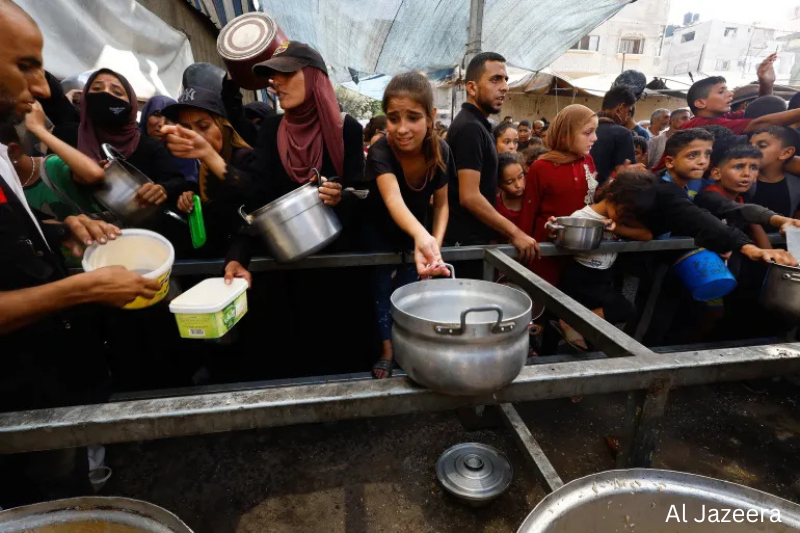Starvation has long been used as a silent weapon of war, devastating entire populations while often escaping the legal accountability that accompanies other acts of violence. Despite international laws explicitly prohibiting the deliberate deprivation of food, hunger continues to be framed as unavoidable suffering rather than an intentional act of cruelty. History and present conflicts demonstrate that starvation is not merely a consequence of war — it is a weapon wielded deliberately, with catastrophic consequences.
The Bengal Famine: A Historical Case of Deliberate Hunger
In September 1943, Bengal was gripped by a man-made famine that killed thousands each week. India, under British colonial rule, had been drawn into World War II as a supplier of troops, exports, and resources for the Allied campaign against Japan. In 1942, the British authorities introduced a “scorched earth” policy across Bengal, Assam, Bihar, Orissa, and parts of Madras. The order mandated that the army destroy food stocks and disable transportation systems — road, rail, river, and sea — to prevent Japan from accessing supplies.
While the policy may have been framed as a defensive strategy, the result was devastating. Millions of civilians were left without food. Hospitals were overwhelmed, streets filled with starving bodies, and the police’s “Corpse Disposal Squad” removed thousands of victims every month.
At the same time, British officials in London debated relief. Secretary of State for India Leo Amery urged Winston Churchill’s cabinet to send 500,000 tons of grain to Bengal. The request was largely dismissed, with less than a quarter of the supplies allocated. Amery later admitted the cabinet had treated the crisis as a bluff. Within a few years, three million people had died from starvation and famine-related disease.
The tragedy was not simply a natural disaster. It was, by all evidence, the direct result of calculated wartime policy and indifference.
Controlling the Narrative: Hiding the Crime
The colonial government attempted to control how the famine was reported. Officials censored newspapers, forbidding “casual references to incidents calculated to arouse horror or alarm.” Instead, the preferred narrative focused on relief efforts and long-standing poverty, presenting starvation as an unfortunate but inevitable reality.
The Statesman, an English-language paper in India, defied those orders. Its editor Ian Stephens published photos and reports showing the scale of death. Even so, British authorities sought to change the language of reporting. Terms like “starvation” were replaced with “sick destitutes,” reframing the deaths as the result of misfortune rather than political choices. This linguistic shift was significant: it erased the idea of perpetrators and intent, shielding policymakers from accountability.
Why Starvation Rarely Sees Justice
The failure to prosecute starvation as a war crime did not end with Bengal. After World War II, the architects of international law avoided criminalizing starvation in meaningful ways because they themselves had relied on food blockades and resource deprivation as tools of warfare and colonial control.
Although international law has since evolved — the 1977 Additional Protocols to the Geneva Conventions explicitly outlaw starvation of civilians, and the Rome Statute of the International Criminal Court (ICC) codifies it as a war crime — prosecutions remain rare.
One reason is evidentiary complexity. Unlike bombing or massacres, which produce immediate and visible destruction, starvation unfolds slowly. Its impact is diffuse and often masked behind economic policies, sanctions, or military sieges. Prosecutors must prove intent: that leaders sought to starve civilians rather than simply failing to manage food supply chains. Governments often defend such measures as “legitimate” military strategy, further complicating accountability.
The Human Toll of Starvation as a Weapon
Despite these challenges, the devastation caused by deliberate starvation cannot be understated. It cripples societies in ways as destructive as bombs. Hunger weakens entire populations, destroys livelihoods, and leaves scars — physical, psychological, and economic — that last for generations.
Today, the issue is not merely historical. In Gaza and other conflict zones, starvation is once again used as a weapon. The slow grind of deprivation creates humanitarian crises that the world too often views as unfortunate by-products of war rather than intentional acts of violence.
Why Enforcement Matters
For decades, courts and prosecutors have failed to fully confront starvation as the deliberate crime it is. This failure emboldens governments and military leaders to continue using hunger as a weapon with little fear of consequences. The absence of accountability allows starvation to remain hidden in plain sight, a silent crime carried out under the cover of policy.
Recognizing starvation as deliberate violence is only the first step. Prosecutors, courts, and international bodies must enforce existing laws and treat starvation as seriously as they would chemical weapons or bombings. Without accountability, millions more may face the same fate as those in Bengal — victims of a weapon that starves silently, slowly, and invisibly.
%20(4).png)




.jpg)
.png)
.png)
.png)
